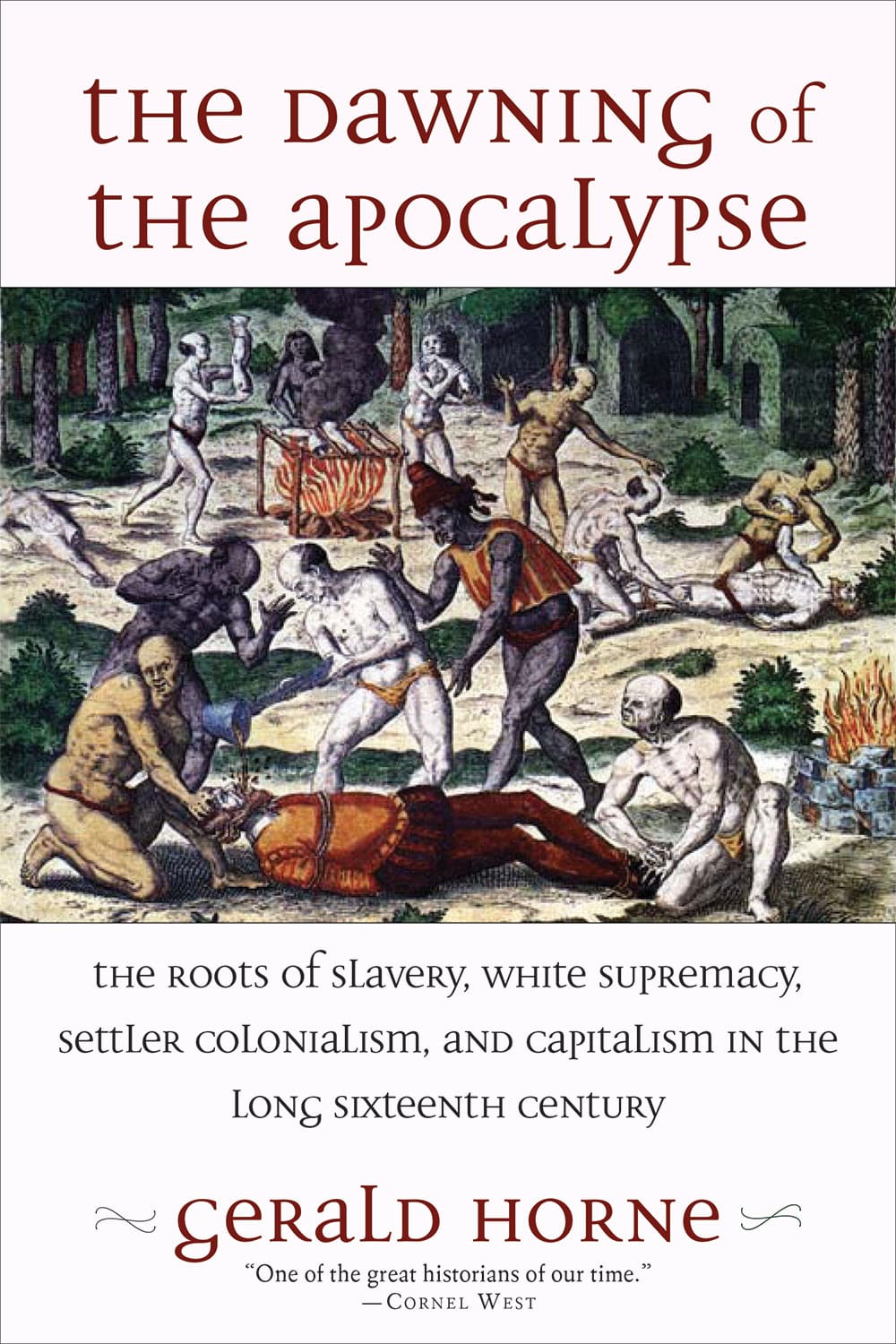The Dawning of the Apocalypse: The Roots of Slavery, White Supremacy, Settler Colonialism, and Capitalism in the Long Sixteenth Century
$19.00 – $95.00

Winner of the 2021 American Book Award. See Toni Mooney Smith, “From Humble Beginnings, Gerald Horne Wins American Book Award for Exploring History of Marginalization,” University of Houston, September 16, 2021.
August 2019 saw numerous commemorations of the year 1619, when what was said to be the first arrival of enslaved Africans occurred in North America. Yet in the 1520s, the Spanish, from their imperial perch in Santo Domingo, had already brought enslaved Africans to what was to become South Carolina. The enslaved people here quickly defected to local Indigenous populations, and compelled their captors to flee. Deploying illuminating research, The Dawning of the Apocalypse is a riveting revision of the “creation myth” of settler colonialism and how the United States was formed. Here, Gerald Horne argues forcefully that, in order to understand the arrival of colonists from the British Isles in the early seventeenth century, one must first understand the “long sixteenth century”—from 1492 until the arrival of settlers in Virginia in 1607.
During this prolonged century, Horne contends, “whiteness” morphed into “white supremacy,” and allowed England to co-opt not only religious minorities but also various nationalities throughout Europe, thus forging a muscular bloc that was needed to confront rambunctious Indigenes and Africans. In retelling the bloodthirsty story of the invasion of the Americas, Horne recounts how the fierce resistance by Africans and their Indigenous allies weakened Spain and enabled London to dispatch settlers to Virginia in 1607. These settlers laid the groundwork for the British Empire and its revolting spawn that became the United States of America.
Gerald Horne is one of the great historians of our time. His scholarly erudition is impeccable and his revolutionary fervor is undeniable.
—Cornel West, public intellectual; author, Race Matters
Admirably direct and astonishingly learned, this brilliant study upends the conceit of US historians that the origins of race, and especially whiteness, can be located in little patches of the Anglosphere that became parts of the original United States. Telling a much bigger and more compelling story—one featuring a Black Atlantic that includes Africa and Spain, and their Islamic worlds, as well as broader swathes of the Americas—Horne dramatically rewrites not only the history of race but also that of capitalism.
—David Roediger, author, How Race Survived US History
Gerald Horne has probed the founding of the United States in previous brilliant books; now he goes back in time to the origins of European colonialism in the 16th century, seeking the origins of the ideology of white supremacy. The Dawning of the Apocalypse presents an original narrative that challenges the myths of United States exceptionalism.
—Roxanne Dunbar-Ortiz, author, An Indigenous Peoples’ History of the United States
Brilliant and uncompromising as ever, in his latest effort Gerald Horne traces the roots of settler colonialism to their points of origin, along the way demolishing a host of triumphalist myths enshrined by contemporary settler societies seeking to valorize the history of how they came to be. The Dawning of the Apocalypse is indispensable reading for anyone wishing to understand how the past has shaped our present circumstance and thus plot the course necessary to reach a radically better destination in the future.
—Ward Churchill, author, Wielding Words Like Weapons
A brilliant work, The Dawning of the Apocalypse traces globalization and U.S. racial formation to Europe’s transition from feudalism to capitalism, illustrating how, in the process, white supremacy triumphed over religious difference. Gerald Gerald Horne’s richly detailed, powerful analysis provides the foundation for understanding contemporary Angloamerican settler colonialism, particularly the symbiotic relationship between African enslavement and Indigenous dispossession.
—Natsu Taylor Saito, author, Settler Colonialism, Race, and the Law: Why Structural Racism Persists
Gerald Horne’s extraordinary work brings into focus the emergence and decline of intersectional global histories across Europe, Africa, and Asia, leading to Pan-European colonization. With an acute historian-analytical voice and enthralling storytelling, Horne lays to bare the role of early empires and the defining inhumanity unleashed for material greed which culminated into the Apocalypse of Slavery, White Supremacy, Settler Colonialism, and Capitalism. While questioning the dominant Eurocentric narrative, The Dawning of the Apocalypse also offers us a pathway towards a new Humanity.
—Danny Glover, Citizen-Artist
In The Dawning of the Apocalypse, Gerald Horne has rendered an astonishing reorientation of the violent advent of global modernity and the brutal collisions of Europe with the Americas, Africa, and the Middle East. For Horne, the “long sixteenth century”—the tempestuous years of conquest, exploitation, and dispossession between 1492 and 1607—provides a blood-stained archive explaining the predilections of our present. In those years, an emergent “Pan-European” project began an assault against Islam, the peoples and states of Africa, and the indigenous populations of the Americas—jump-starting the expropriative machine of colonialism, giving rise to whitesupremacy, and stoking the infernal engines of modern capitalism. At once meticulously researched and rigorously argued, The Dawning of the Apocalypse is another stunning masterwork from the preeminent radical historian of our era.
—Jemima Pierre, UCLA; author, The Predicament of Blackness
Gerald Horne is John J. and Rebecca Moores Professor of African American History at the University of Houston. A prolific scholar, he has written more than three dozen books for which he has garnered many awards. These include Confronting Black Jacobinsa and The Dawning of the Apocalypse, both published by Monthly Review Press, along with Race to Revolution and Jazz & Justice.
Publication Date: June 2020
Paperback ISBN: 978-1-58367-872-5
Cloth ISBN: 978-1-58367-873-2
eBook ISBN: 978-1-58367-874-9
Number of Pages: 304
Related products
-
Monthly Review Volume 2, Number 10 (February 1951) [PDF]
$10.00 Add to cart -
Monthly Review Volume 2, Number 6 (October 1950) [PDF]
$10.00 Add to cart -
Monthly Review Volume 2, Number 4 (August 1950) [PDF]
$10.00 Add to cart -
Monthly Review Volume 1, Number 6 (October 1949) [PDF]
$10.00 Add to cart -
Monthly Review Volume 1, Number 4 (August 1949) [PDF]
$10.00 Add to cart -
Imperialism and World Economy
$15.00 Select options This product has multiple variants. The options may be chosen on the product page

 [PDF].jpg)
 [PDF].jpg)
 [PDF].jpg)
 [PDF].jpg)
 [PDF].jpg)
